| | | | | | | Presented By Babbel | | | | Axios World | | By Dave Lawler · Oct 03, 2022 | | Welcome back to Axios World. - Tonight's edition (1,928 words, 7 minutes) takes off from Iran, with stops in Brazil, Burkina Faso and more.
🚨 Situational Awareness: "A projectile that appears to be a North Korean ballistic missile has likely flown over Japan," Japan's Prime Minister's Office has just tweeted. New arrival? Subscribe. | | | | | | 1 big thing: Defiance spreads in Iran despite crackdowns | 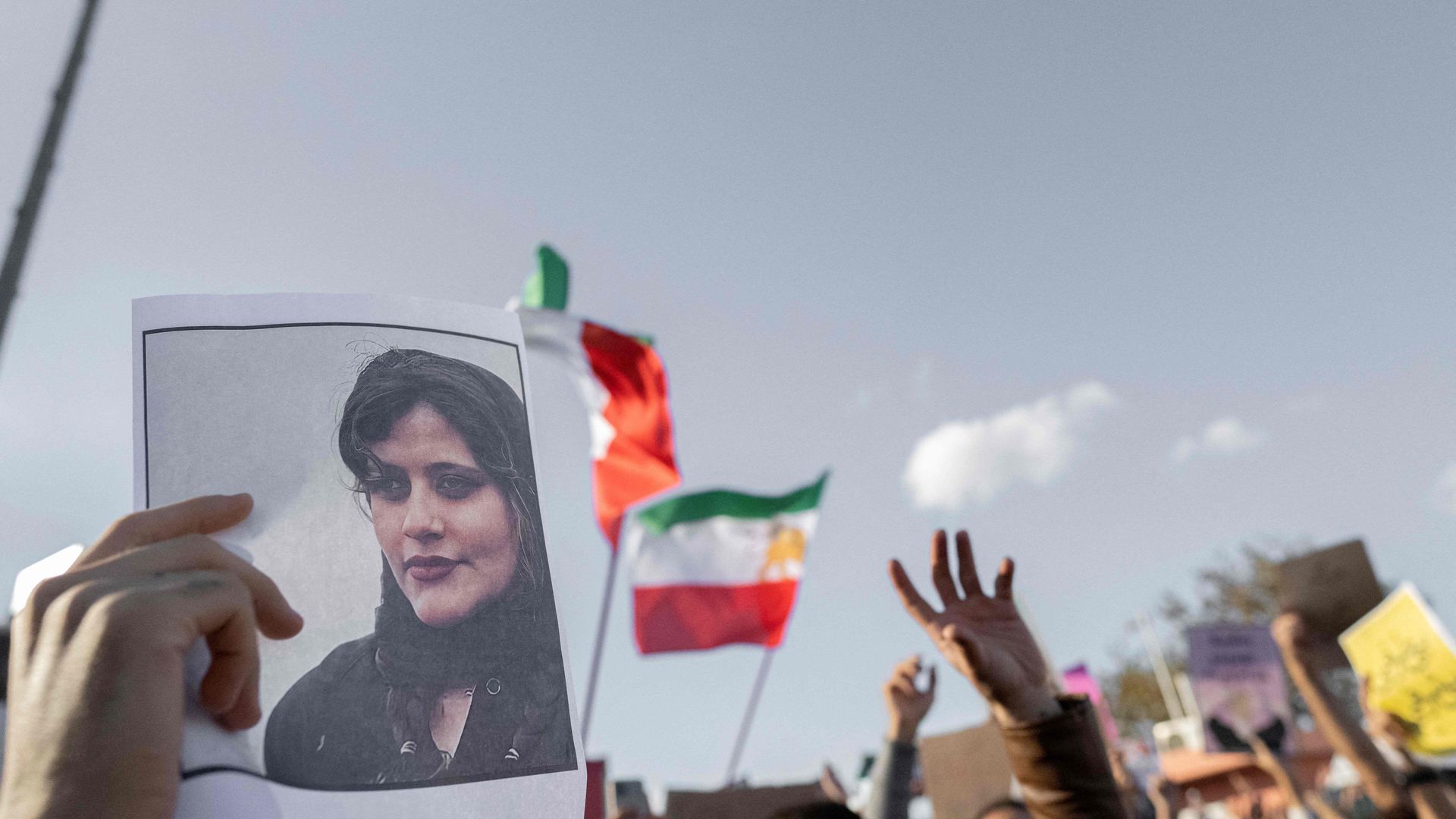 | | | A protester holds a photo of Mahsa Amini in Istanbul. Photo: Bulent Kilic/AFP via Getty Images | | | | Supreme Leader Ali Khamenei broke his silence Monday after 17 days of protests in Iran, saying the death of Mahsa Amini was heartbreaking but claiming without evidence the ensuing "riots" had been instigated by the U.S. and Israel. The big picture: Amini, 22, died after being detained by the morality police for "improper hijab," the mandatory head covering. A viral image of her lying in a hospital bed fueled outrage, and protests that began at her funeral in Iran's Kurdistan province have swept through the country. - The protesters have taken up the rallying cry of "woman, life, freedom," while some have chanted "death to the dictator," referring to Khamenei. Students and members of Iran's long-marginalized Kurdish minority have been particularly vocal.
- Police claimed Amini was not mistreated and that she died of a heart attack. Her family claims she had no health conditions and was beaten.
- Videos have spread widely of women and girls marching through cities waving or burning their headscarves or defiantly turning up to schools without wearing them.
- Iranian authorities have responded with targeted internet shutdowns, tear gas and in some cases lethal force. The death toll stands at 133, according to Iran Human Rights, a Norway-based NGO. That number could not be independently verified. Iranian state TV put the number at 41 dead, including police.
Driving the news: Sunday was supposed to be the first day of classes at Tehran's Sharif University of Technology, but dozens of students gathered instead to protest. - Security forces flooded into campus, firing tear gas and paintball pellets as the students attempted to flee, before making arrests.
- "What you see from Iranian authorities is clearly an attempt to subdue protests through sheer force," says Assal Rad of the National Iranian American Council. They're not heeding the calls of the people. They're not giving an inch."
State of play: The protesters have adjusted accordingly, says Mahsa Alimardani, a senior researcher on Iran at the human rights group Article 19. - "Tehran is heavily securitized, but the protests are in little pockets throughout the city," Alimardani says. "So it's no longer everyone gathering in one boulevard at night, it's apartment blocks doing chants or three or four people gathering on a bridge."
- While the demonstrators are building on major protests in 2019 and 2009, this time around they're being led by women and in particular by Gen Z, says Alimardani, though people of various ages and socioeconomic backgrounds have joined in.
- Several high-profile musicians and sports stars in Iran have also spoken out, despite the risk of arrest.
What to watch: Analysts have debated whether the protests pose a genuine threat to the 43-year-old theocratic regime. - A sizable portion of the population, though perhaps not a majority, supports the state and will be inclined to likely believe Khamenei's claims that the protests were instigated from abroad, Rad says. Pro-regime counterprotests have also been organized.
- But the events may change Iran even if they don't change the government, says Alimardani. "After the stand they've made here, there's really no going back."
Go deeper: Iran protests spark wider adoption of anti-censorship tools |     | | | | | | 2. Brazil's presidential showdown heads to runoff | 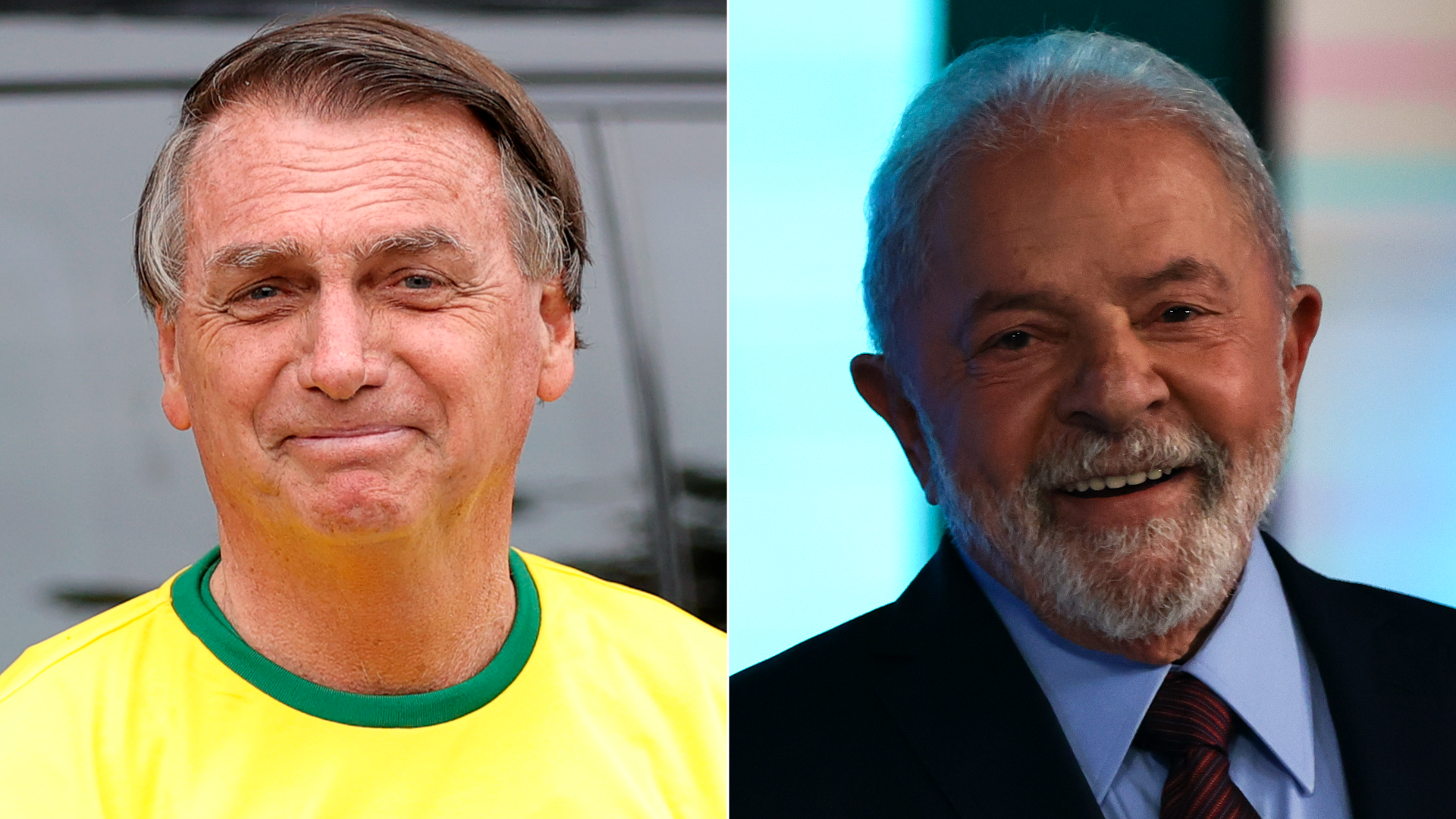 | | | Jair Bolsonaro and Luiz Inácio Lula da Silva. Photos: Buda Mendes/Getty Images | | | | Brazil's presidential election is heading to an Oct. 30 runoff after President Jair Bolsonaro denied former President Luiz Inácio Lula da Silva the majority he needed for an outright victory. Why it matters: Bolsonaro outperformed the polls, finishing with 43.2% to Lula's 48.4%, a testament to the enduring strength of "Bolsonarismo." - "Some people believed Bolsonaro would lose big, and he would go down in Brazilian history as a kind of aberration. That's over now," writes Brian Winter, editor of Americas Quarterly.
- Every major poll in the week before the election showed Lula winning by at least 7 points, and a Datafolha poll had the veteran leftist up by 14.
What they're saying: Bolsonaro labeled the pollsters the "biggest losers of this election," promised to do more to overcome concerns of poor voters, and vowed that he was on course for victory. - Lula said he looked forward to debating Bolsonaro head-to-head, and said he was determined to win over voters "who think they don't like us."
- Bolsonaro's right-wing allies also had a strong performance in congressional elections, meaning that even if Lula is elected he will find it difficult to pass major legislation.
Between the lines: The initial shock about the results was driven in part by the order in which they were tallied, with some Lula strongholds reporting later and Bolsonaro thus appearing to be in the lead. - Lula's 5.2% margin and his likely advantage among the 8.4% of voters who backed now-eliminated candidates make him a relatively strong favorite in the runoff.
- But the extra month of campaigning gives Bolsonaro a chance to capitalize on his momentum and raise further questions about Brazil's electoral system.
|     | | | | | | 3. Global news roundup | 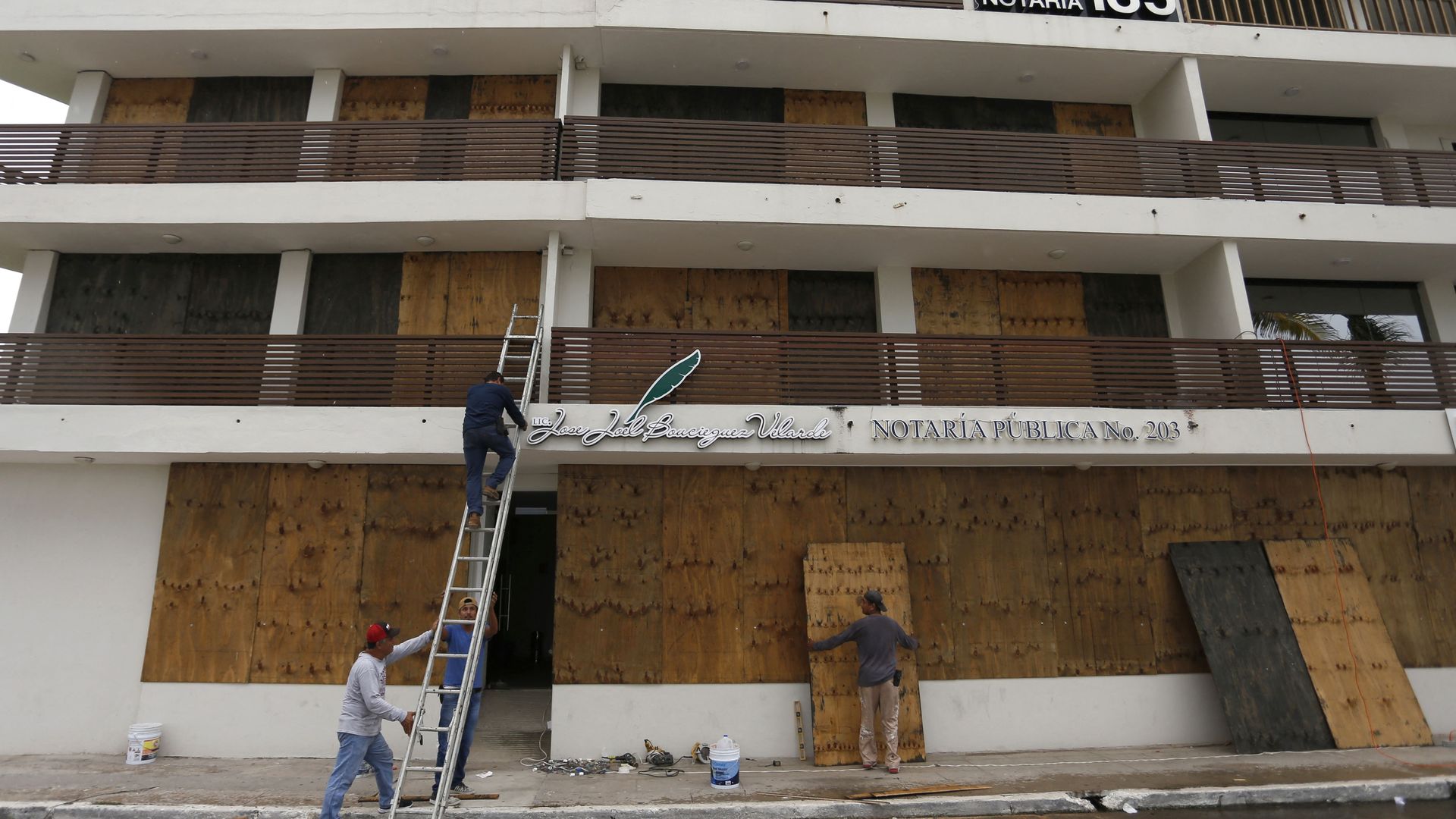 | | | Workers board up a seafront building ahead of the arrival of Hurricane Orlene, in Mazatlan, Mexico. Photo: AFP via Getty Images | | | | 1. Indonesia will hold an independent inquiry into Saturday night's soccer stadium disaster that left at least 125 people dead. - Driving the news: Police used tear gas in a packed stadium as fans of the home team flooded the pitch after their team's defeat.
2. The UN-brokered truce in Yemen expired on Sunday, raising fears the war-torn country could return to the full-blown fighting that had largely been on pause for six months. - What to watch: Talks are ongoing, though both sides blamed each other for failing to extend the truce. Hans Grundberg, the UN's special envoy to Yemen, called on the country's warring parties to "maintain calm and refrain from provocations."
3. Haitian officials this weekend reported the country's first cholera deaths in three years, renewing fears of a resurgence of a disease that killed nearly 10,000 people a decade ago. - Flashback: UN peacekeepers were blamed for introducing cholera into the country's largest river in 2010.
- State of play: Haiti has been rocked by gang violence in recent months. The country's largest gang is blocking the main entrance of the Port-au-Prince fuel terminal, leading to fuel shortages and forcing some hospitals to shut down or scale back operations, per Reuters.
4. Venezuela and the U.S. conducted a rare prisoner swap Saturday, freeing seven Americans from the South American country in exchange for two relatives of Venezuelan President Nicolás Maduro, the White House said. 5. Yesterday's elections in Bosnia were poised to yield gains for some more moderate candidates even as the primary ethno-nationalist parties looked set to control the country's national and entity parliaments, preliminary results show. - Why it matters: Bosnia has what is often described as the world's most complicated system of government and its composition is structured to favor nationalist tendencies. But Sunday's result could provide an opportunity for reformist forces to wield more political influence in the country, Axios' Ivana Saric writes.
|     | | | | | | A message from Babbel | | Language lessons you can use in the real world | | |  | | | | Language learning platform Babbel offers 10-minute lessons that are proven to help users learn a new language in just three weeks. How it's done: Instead of random phrases, you'll learn to hold real-world conversations with expert-curated lessons and more. Get up to 55% off your subscription | | | | | | Bonus: Where in the world? | 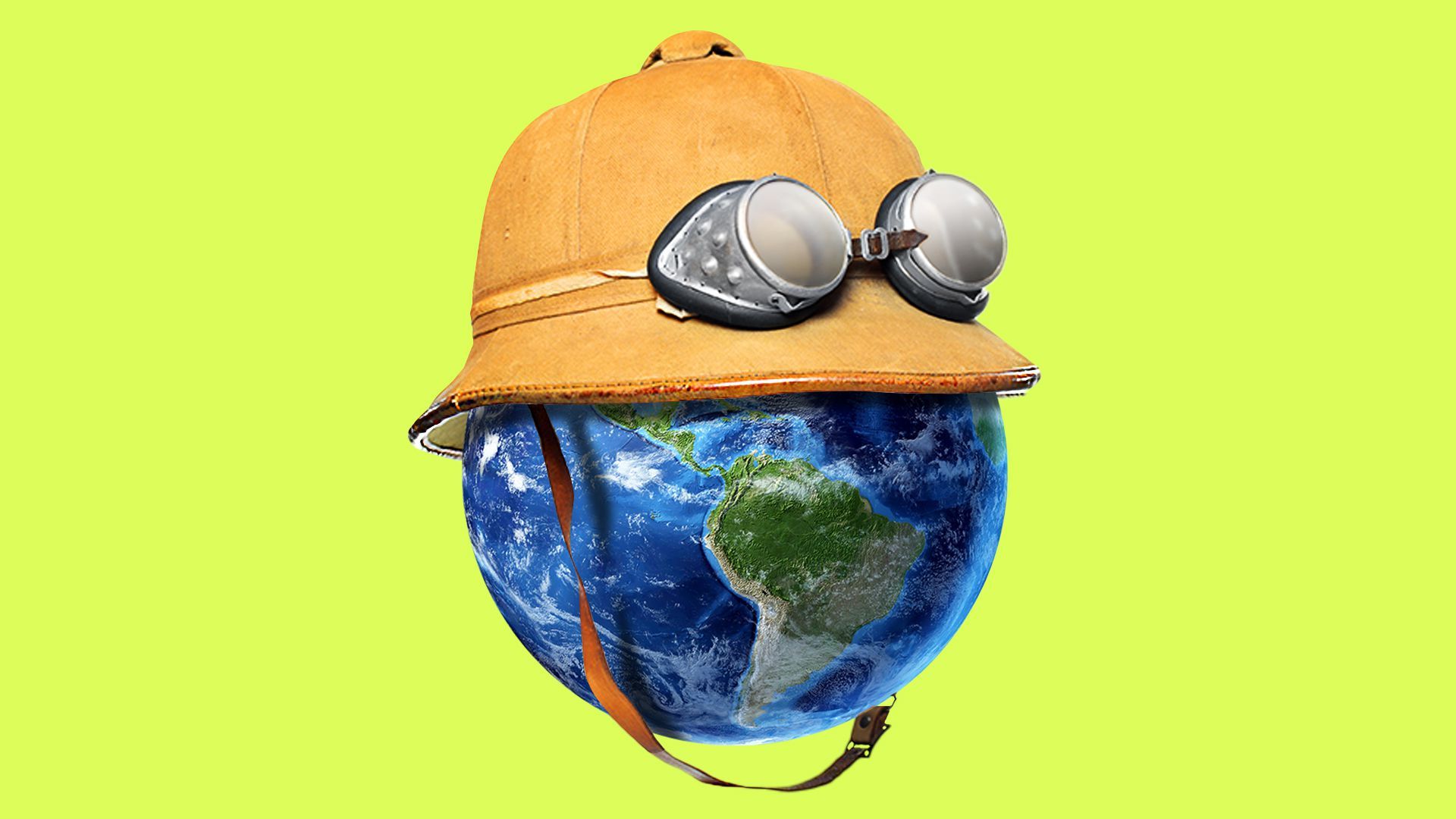 | | | Illustration: Natalie Peeples/Axios | | | | Six countries have a cardinal direction (North, South, East or West) in their names. Can you name all six? - Hint: Two gained independence in the last 25 years and one changed its name in 2018.
Scroll to the bottom for answers. |     | | | | | | 4. Ukraine's advance spoils Putin's annexation celebration | 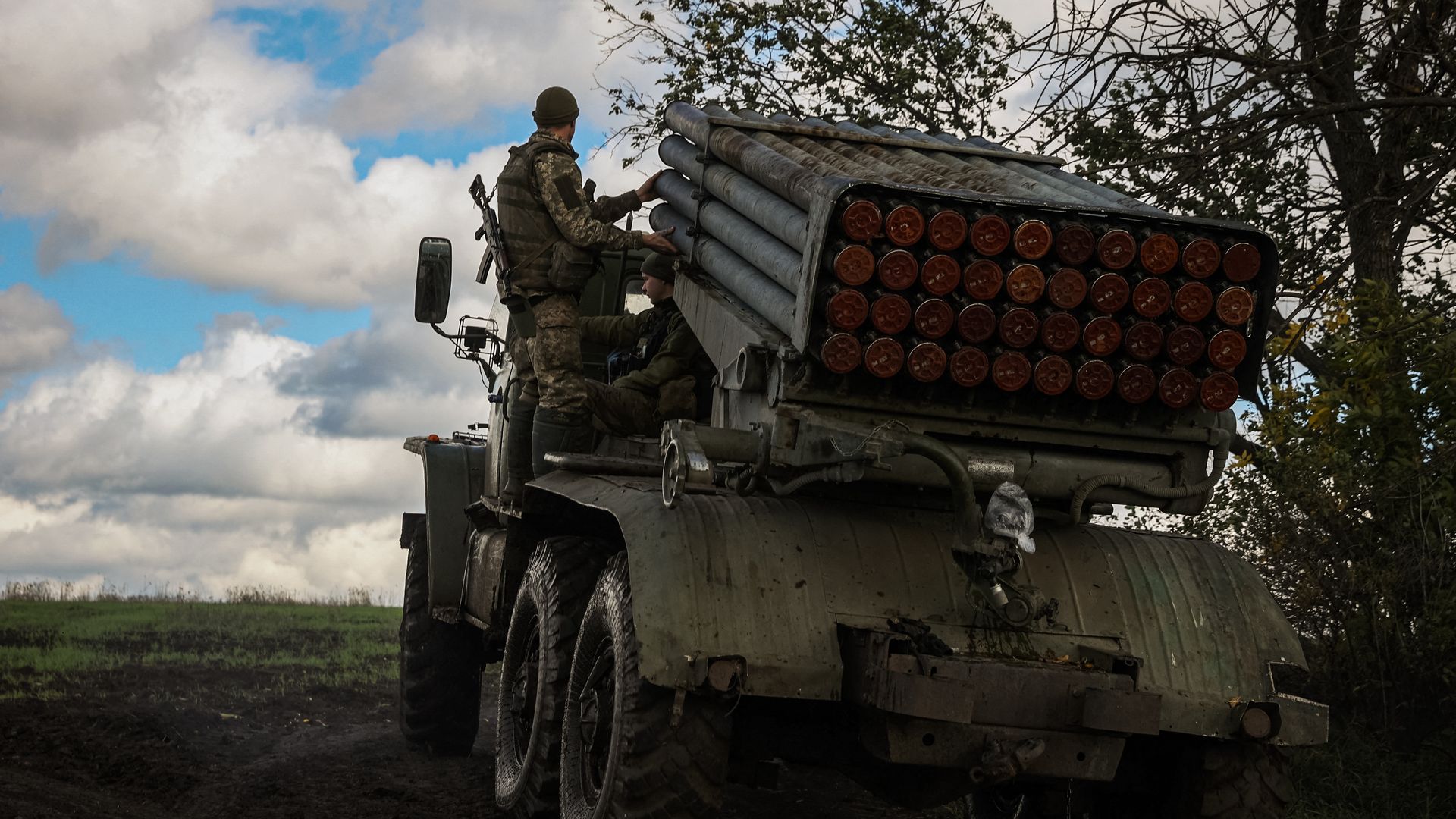 | | | The crew of a BM-21 multiple rocket launcher near the front lines in Donetsk. Photo: Anatoli Stepanov/AFP via Getty Images | | | | Ukrainian forces have made key breakthroughs on two fronts in the 72 hours since Vladimir Putin claimed the areas in question to be part of Russia. Driving the news: Ukraine retook multiple towns in the southern region of Kherson, and continued their advance in the northeast by retaking the key logistics hub of Lyman. - Frustrations with Russia's battlefield setbacks are being aired on state TV, and a top Russian commander was fired.
- Putin on Friday claimed four Ukrainian oblasts — Donetsk, Luhansk, Kherson and Zaporizhzhia — that Moscow only partly controls to be part of Russia.
Yes, but: Russia currently has no clear definition of its own external borders at a time when Putin has threatened to use nuclear weapons if Russian territory is attacked. - Asked Monday whether all of Kherson and Zaporizhzhia were now part of Russia or just the parts Russia holds, Putin's spokesperson Dmitry Peskov said Moscow was still "consulting with the local population."
What to watch: Peskov also responded to Chechen leader Ramzan Kadyrov's suggestion that Russia use a "low-yield nuclear weapon" on the battlefield by saying Russia would take a "balanced approach." |     | | | | | | 5. Will Putin go nuclear? | 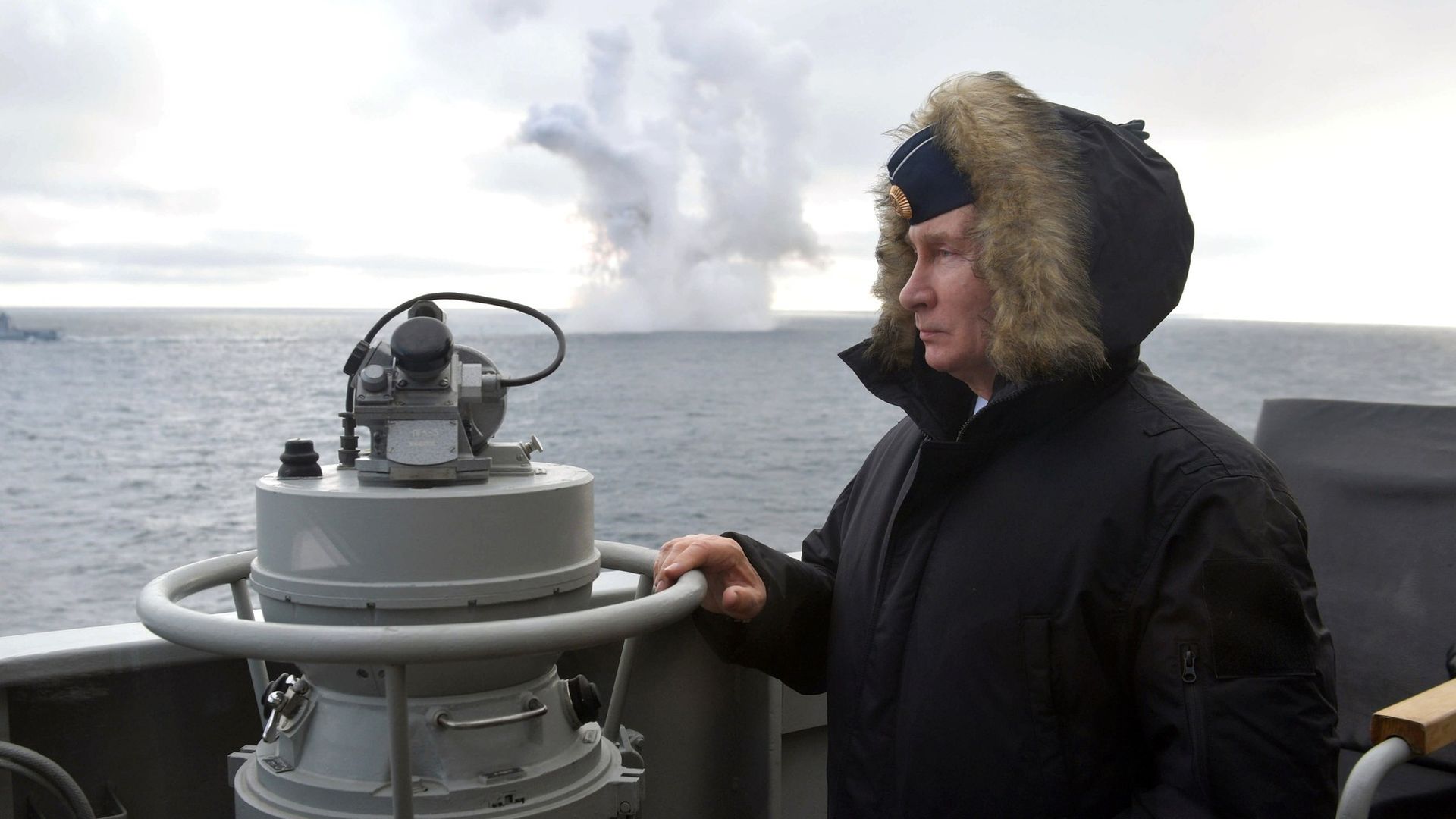 | | | Putin watches a naval exercise from a cruiser in the Black Sea in January 2020. Photo: Alexei Druzhinin/Russian presidency handout via Getty Images | | | | Putin's nuclear threats are growing more direct as his battlefield position grows more precarious. State of play: After warning last week that Russia would consider using nuclear weapons, Putin added, "This is not a bluff." - National security adviser Jake Sullivan conceded Friday that it might well not be. "There is a risk, given all the loose talk and the nuclear saber-rattling by Putin, that he would consider this," he said.
- Sullivan said the White House had informed the Kremlin of the "decisive" action the U.S. would take if Putin follows through.
Driving the news: Sullivan was responding to an address in which Putin confirmed Russia was extending its nuclear umbrella to the four newly annexed territories. - Putin also said the U.S. had itself "set a precedent" for the use of nuclear weapons when it bombed Hiroshima and Nagasaki.
Between the lines: Putin seems to believe that if he can convince the U.S. and its NATO allies that he's willing to use nuclear weapons over Ukraine, they will pressure Kyiv to surrender, says Alexander Gabuev of the Carnegie Endowment. - The problem for Putin is that the Ukrainian government, military and public believe they're on course for victory and won't be deterred by nuclear threats, Gabuev says. The U.S., meanwhile, is only increasing its arms shipments to Ukraine.
- But if Ukraine continues to re-take territory Putin has now claimed is part of Russia, he may believe his only option is escalation.
If Putin does go nuclear, he could seek a "demonstration effect" — perhaps over the Black Sea or in the Arctic — or deploy a smaller-yield "tactical" nuclear weapon on the battlefield, says Andrea Kendall-Taylor of the Center for a New American Security. - In response, the U.S. would likely conduct a conventional military strike on Russian soil — perhaps targeting the site or unit behind the Russian launch, Kendall-Taylor says.
- Rose Gottemoeller, the former deputy secretary-general of NATO, says the diplomatic costs would also be high for Putin. "He will lose the global south, which for him should be a great shame because he's been very clever at keeping them on his side."
Read the full piece. |     | | | | | | 6. One to watch: Russia on the rise in West Africa |  | | | With a Russian flag waving, pro-coup protesters stand atop a UN armored vehicle in Ouagadougou, Burkina Faso. Photo: AFP via Getty Images | | | | Burkina Faso's second coup this year had a striking geopolitical dimension. Driving the news: Capt. Ibrahim Traoré grabbed power on Friday from fellow coup plotter Lt. Col. Paul-Henri Damiba, whom he accused of failing to deal with jihadi extremists. Much of the country is largely outside of the government's control, and violence is getting worse. - Supporters of the coup attacked the French Embassy, accusing the French of harboring Damiba, which Paris denied.
- Meanwhile, Traoré's backers also waved Russian flags and called for military support, per AP. Russian mercenaries are active in neighboring Mali, where they've been accused of human rights abuses.
- France withdrew its last soldiers from Mali last month after a decade-long intervention, but it still has a presence with Niger and has been competing with Russia for influence in its former colonies in West Africa.
What they're saying: The new junta said Saturday that it wanted to move forward with "other partners," without naming Russia. |     | | | | | | 7. Stories we're watching | 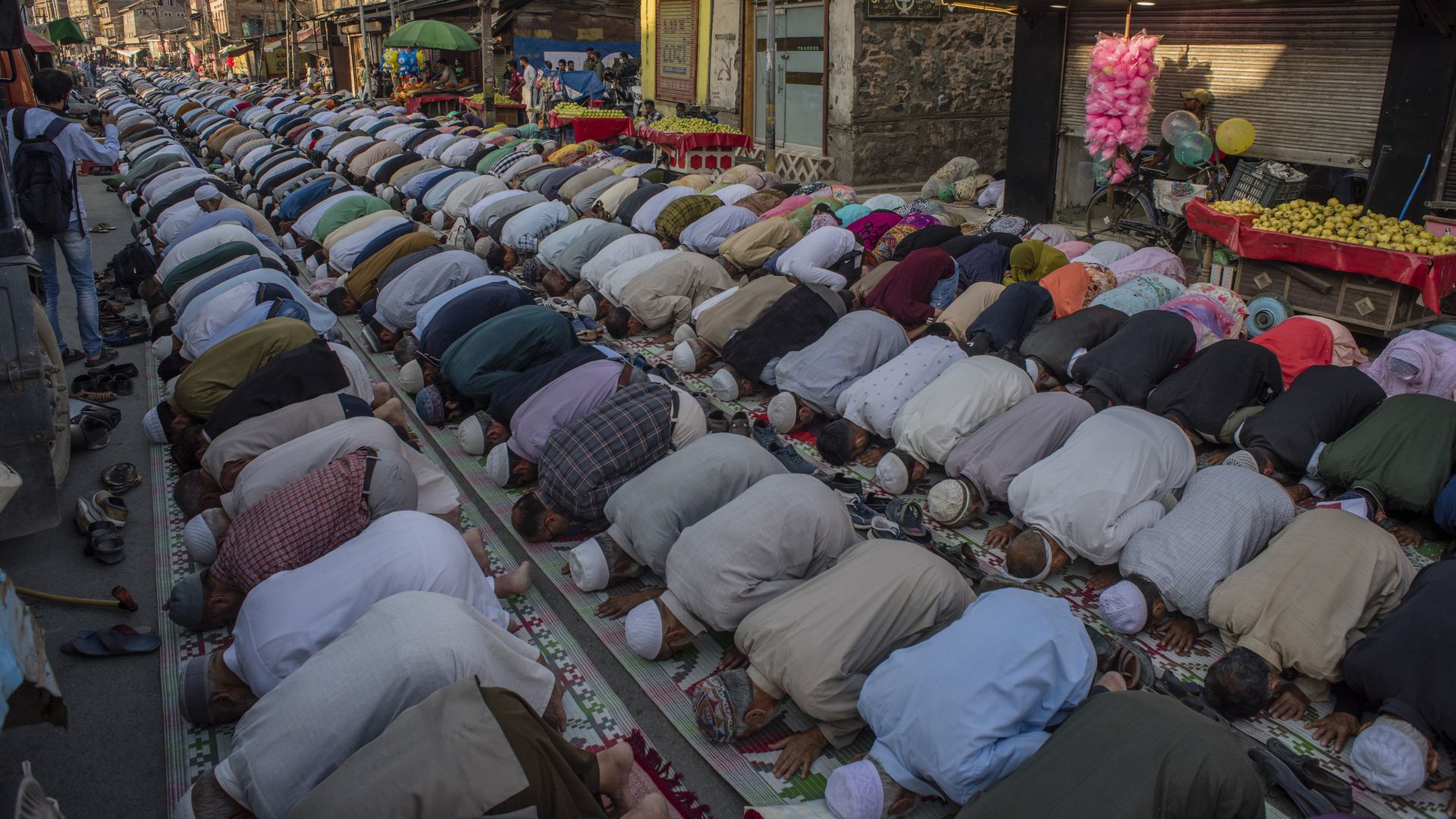 | | | Praying in Srinigar, Kashmir. Photo: Yawar Nazir/Getty Images | | | - Griner's appeal set for Oct. 25
- U.K. government reverses tax cut plans for highest earners
- Deal seems close in Lebanon-Israel maritime dispute
- Nord Stream explosions caused by "several hundred kilos" of explosives
- Russia detains Zaporizhzhia nuclear plant leader
- Sen. Menendez warns Netanyahu over Jewish supremacist allies
- Blinken marks four years since Khashoggi murder
Quoted: "Which @elonmusk do you like more: - One who supports Ukraine
- One who supports Russia?"
— A Twitter poll from Volodymyr Zelensky, replying to Elon Musk's controversial peace proposal |     | | | | | | A message from Babbel | | Say "ja" to learning a new language | | |  | | | | Babbel has what you need to learn how to hold real-world conversations in Dutch, Spanish and more. Learn through: - Expert-curated lessons.
- Speech technology that improves your accent.
- Context and cultural tips.
- Live online classes or videos.
Speak a new language in as little as three weeks. | | | | Answers: East Timor; North Korea; North Macedonia; South Africa; South Korea; South Sudan. |  | | Are you a fan of this email format? It's called Smart Brevity®. Over 300 orgs use it — in a tool called Axios HQ — to drive productivity with clearer workplace communications. | | | | | | Axios thanks our partners for supporting our newsletters. If you're interested in advertising, learn more here.
Sponsorship has no influence on editorial content. Axios, 3100 Clarendon Blvd, Arlington VA 22201 | | | You received this email because you signed up for newsletters from Axios.
Change your preferences or unsubscribe here. | | | Was this email forwarded to you?
Sign up now to get Axios in your inbox. | | | | Follow Axios on social media:    | | | | | |












No comments:
Post a Comment